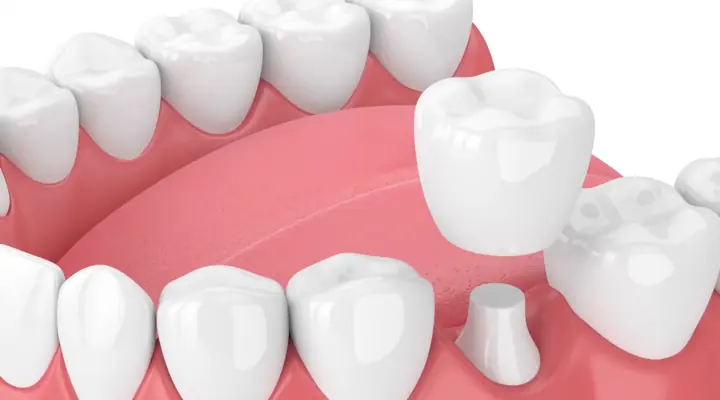Dental crowns play an essential role in restoring not only the function but also the beauty of damaged teeth. When a tooth is weakened, fractured, or has undergone extensive treatment like a root canal, it often needs more than just a filling to regain its strength. That’s where dental crowns come in—providing a protective, custom-fit cap that preserves the tooth while enhancing its appearance.
Beyond aesthetics, crowns restore chewing efficiency, protect vulnerable teeth from further damage, and even serve as critical components in more complex restorative procedures, such as dental implants or bridges. For patients dealing with significant dental issues, crowns offer a reliable, long-lasting solution that helps maintain a healthy, functional smile.
What Are Dental Crowns And How Do They Function In Restorative Dentistry?
A dental crown is a “cap” that fits over a damaged, decayed, or weakened tooth to restore its shape, size, strength, and appearance. Crowns are custom-made to blend seamlessly with surrounding teeth, preserving the natural look of a patient’s smile. Once a crown is bonded to the tooth, it provides a robust barrier that protects the underlying structure from further damage or decay.
In restorative dentistry, crowns serve several essential functions:
- Reinforcement of Damaged Teeth: When a tooth’s structure is compromised due to decay, trauma, or wear, a crown reinforces the tooth, allowing it to function normally and withstand everyday forces like biting and chewing.
- Protection Against Further Decay: Crowns seal off vulnerable areas of a tooth, preventing bacteria and plaque from infiltrating and causing additional damage.
- Improvement of Aesthetic Appearance: Crowns can restore the shape and color of damaged or discolored teeth, contributing to an attractive and natural smile.
Dental crowns are a staple in restorative dentistry because they improve tooth function and appearance. This makes them a go-to solution in complex cases where other treatments may not provide the necessary durability or aesthetic appeal.
In What Situations Are Dental Crowns Recommended For Patients?
Crowns are recommended in various dental situations where other options may not provide adequate support or protection. Dental professionals often suggest crowns when teeth are extensively damaged or when patients risk losing a tooth due to structural issues. Here are some common scenarios in which dental crowns are invaluable:
- Severe Tooth Decay: A crown provides the necessary strength and stability for teeth with large cavities or areas of decay that cannot be restored with a filling alone.
- Root Canal Treatments: A crown is typically placed over the treated tooth to restore its strength and functionality after a root canal procedure. The crown is a protective cover since a root canal weakens the tooth.
- Cracked or Fractured Teeth: When a tooth is cracked or fractured, particularly if the damage extends into the root, a crown helps to hold the tooth together and prevent further breakage.
- Cosmetic Enhancements: Crowns offer an aesthetic improvement along with functional benefits in cases where teeth are discolored, misshapen, or worn down.
- Support for Dental Bridges: Crowns can also anchor dental bridges, providing stability to the adjacent teeth and ensuring the bridge’s longevity.
These cases highlight how dental crowns can prevent tooth loss, minimize discomfort, and restore a patient’s ability to chew and speak comfortably. Crowns’ adaptability makes them an effective option for a wide range of complex restorative cases.
What Materials Are Commonly Used For Dental Crowns In Complex Cases?
The material used for a dental crown is selected based on the patient’s specific needs, the location of the tooth, and the desired durability and aesthetics. Here are some of the most common materials used for dental crowns, particularly in complex cases:
- Porcelain and Ceramic Crowns: These are highly popular for their natural appearance, as they can be color-matched to surrounding teeth. Porcelain and ceramic crowns are often used for front teeth or other visible areas, where aesthetics are a primary concern.
- Metal Crowns: Gold, palladium, and other metal alloys are often used for crowns placed on molars, which must withstand significant chewing pressure. While not as natural-looking as porcelain, metal crowns are incredibly durable and resistant to wear.
- Porcelain-Fused-to-Metal (PFM) Crowns: These crowns balance durability and aesthetics. The metal base provides strength, while the porcelain layer on top offers a natural appearance, making them suitable for front and back teeth.
- Zirconia Crowns: Zirconia is a newer material that combines the durability of metal with the natural look of porcelain. It is strong, highly biocompatible, and can be shaded to match natural teeth, making it ideal for both cosmetic and functional purposes.
Each material has its benefits and drawbacks, so the choice of crown material depends on the specific needs of the patient, the location of the tooth, and other individual factors. For instance, while metal crowns may be the best option for back teeth requiring extra strength, porcelain crowns are preferred for teeth visible when smiling.
How Do Dental Crowns Improve The Longevity And Function Of Damaged Teeth?
One of the greatest advantages of dental crowns is their ability to extend the lifespan of damaged teeth. By covering and reinforcing a weakened tooth, crowns prevent further damage, helping to avoid more invasive treatments down the line. Here’s how crowns contribute to the longevity and functionality of teeth:
- Strengthening Weakened Teeth: Crowns provide a protective barrier, preventing weakened teeth from fracturing or chipping further. This support allows patients to maintain more natural teeth longer, reducing the need for extractions and implants.
- Restoring Natural Bite and Chewing Ability: Damaged or decayed teeth can disrupt a person’s bite, leading to discomfort and difficulty eating. Crowns restore teeth’ natural shape and alignment, allowing patients to chew comfortably and maintain balanced dental function.
- Protection Against Sensitivity and Pain: Exposed or damaged tooth surfaces can lead to discomfort and sensitivity, especially when eating hot or cold foods. Crowns provide a protective covering that minimizes exposure and offers relief from sensitivity.
- Preventing Misalignment and Jaw Issues: When a damaged tooth is left untreated, it can shift or alter the alignment of surrounding teeth. Crowns help keep teeth in place, preserving the proper alignment of the dental arch and reducing the risk of jaw pain or temporomandibular joint (TMJ) issues.
Crowns restore damaged teeth and play a crucial role in maintaining a balanced, functional bite and overall oral health. Their ability to prevent further deterioration of weakened teeth makes them invaluable for patients with complex dental needs.
Dental crowns are more than just a cosmetic solution; they are a cornerstone of restorative dentistry that provides critical benefits for patients with complex dental issues. From reinforcing weak or damaged teeth to enhancing aesthetics and preventing further dental complications, crowns offer a comprehensive solution that promotes long-term oral health.
With various materials available, crowns can be customized to meet each patient’s specific needs, whether the priority is strength, aesthetics, or both. Dental crowns offer a durable, reliable solution for patients facing significant dental challenges that protect teeth and ensure lasting functionality.
Discover the Lasting Benefits of Dental Crowns at River District Dentistry Smiles
At River District Dentistry Smiles, we understand that each patient’s dental needs are unique, especially when it comes to restorative care. Our experienced team is dedicated to providing high-quality dental crowns that restore damaged teeth and contribute to your long-term oral health.
Whether you’re dealing with extensive decay, a cracked tooth, or need reinforcement after a root canal, our crowns are designed to give you a comfortable, natural fit that looks and feels just like your teeth.
We use advanced materials such as porcelain, zirconia, and porcelain-fused-to-metal, ensuring durability and a seamless match to your natural teeth. By choosing River District Dentistry Smiles, you’re opting for crowns that improve the appearance of your smile and the function and longevity of your teeth.
Our personalized approach means we carefully assess your situation, recommend the best material, and customize each crown to enhance aesthetics and oral function. Start your journey toward a healthier smile—schedule a consultation with us today to see how our restorative services can make a lasting impact.
Book Your Dental Crown Consultation Today!
Don’t let damaged or weakened teeth hold you back. At River District Dentistry Smiles, our expertly crafted dental crowns provide the support and aesthetics you need for a confident, healthy smile. Contact us now to schedule your personalized consultation and take the first step toward restoring your dental health and function. Let us help you achieve the resilient, beautiful smile you deserve!


